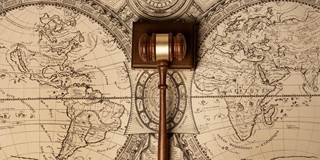Whereas the failure to forge a lasting world order at Versailles resulted in the catastrophe of World War II, the establishment of shared principles under the 1941 Atlantic Charter led to eight decades of prosperity and relative stability. With the world undergoing another geopolitical sea change, a new global charter is needed.
STOCKHOLM – In August 1941, even before the United States had entered World War II, British Prime Minister Winston Churchill and US President Franklin D. Roosevelt met secretly off the coast of Newfoundland to discuss how the world could be organized after the war. A similar feat had been attempted at Versailles just over two decades earlier, but it had clearly failed.
Churchill and FDR’s assignation resulted in the Atlantic Charter, which established a set of shared principles and institutions that still define the international order eight decades later. In 1944, the Bretton Woods conference laid the groundwork for the International Monetary Fund, the World Bank, and other global financial institutions; the establishment of the United Nations soon followed. The defeated Axis powers were transformed into dynamic democracies with market economies, and were integrated into the new global system, while stability was maintained through cooperative security structures spanning the transatlantic and Pacific theaters.
Then came China’s economic reforms, starting in the late 1970s, and the collapse of the Soviet Union in 1991, whereupon the dream of truly global multilateral governance as envisioned in the Atlantic Charter could start to be realized. In 1995, the Bretton Woods-era General Agreement on Tariffs and Trade was replaced with the World Trade Organization, and in under two decades, trade as a share of global GDP has grown from around 40% to over 70% (owing in no small part to China’s accession to the WTO in December 2001).

STOCKHOLM – In August 1941, even before the United States had entered World War II, British Prime Minister Winston Churchill and US President Franklin D. Roosevelt met secretly off the coast of Newfoundland to discuss how the world could be organized after the war. A similar feat had been attempted at Versailles just over two decades earlier, but it had clearly failed.
Churchill and FDR’s assignation resulted in the Atlantic Charter, which established a set of shared principles and institutions that still define the international order eight decades later. In 1944, the Bretton Woods conference laid the groundwork for the International Monetary Fund, the World Bank, and other global financial institutions; the establishment of the United Nations soon followed. The defeated Axis powers were transformed into dynamic democracies with market economies, and were integrated into the new global system, while stability was maintained through cooperative security structures spanning the transatlantic and Pacific theaters.
Then came China’s economic reforms, starting in the late 1970s, and the collapse of the Soviet Union in 1991, whereupon the dream of truly global multilateral governance as envisioned in the Atlantic Charter could start to be realized. In 1995, the Bretton Woods-era General Agreement on Tariffs and Trade was replaced with the World Trade Organization, and in under two decades, trade as a share of global GDP has grown from around 40% to over 70% (owing in no small part to China’s accession to the WTO in December 2001).